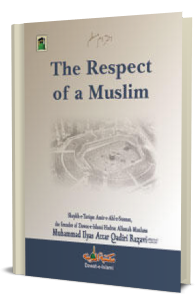
From the Pens of Our Pious Predecessors
The Primary Purpose of a Believer
Ṣadr al-Afāḍil, Mufti NaꜤīm al-Dīn al-Murādābādī رَحْمَةُ الـلّٰـهِ عَـلَيْه
The spiritual representative of Imām Aḥmad Razā Khān رَحْمَةُ اللهِ عَلَيْه, the erudite Quranic exegete, Ṣadr al-Afāḍil, Mufti Sayyid NaꜤīm al-Dīn al-Murādābādī رَحْمَةُ الـلّٰـهِ عَـلَيْه was a mufti par excellence, an erudite scholar of great foresight and an individual of great wisdom. His writings serve as clear proofs for these praiseworthy qualities of his. He wrote a very thought-provoking column on the importance and greatness of Islam. In view of this column’s significance, it is being presented here for the readers of the Monthly Magazine Faizan-e-Madinah:
The deceptive scenes of the world and its bewildering allure baffles the intellect and wisdom. When every soul that passes through the world witnesses the freshness and wonders of the worldly garden, they become enamoured by it and ensnared in its love. Everything here has a greater effect upon him than magic. By becoming caught in the trap of hopes and greed, he makes himself uncontrollable, irrespective of how he entered this world, whether he was born into royalty or in the hut of a pauper, facing hunger and many hardships from the start.
Even if he spent a large portion of his life in difficulties and hardships, love for the world is so dominating that he is willing to face all of that suffering but cannot bear to abandon the world. Even the word “death” is like a thorn for him. There were thousands of kings and rulers, but their end was that they left the bounties of this world and travelled onwards to poverty and solitude. The disloyalty of material wealth and travelling onwards from this world does not dishearten him, and he spends the entirety of his life in acquiring it, sacrificing the invaluable treasure of his life for this traitor (the world).
His love and infatuation with the world are such that he forgets himself and the purpose of his life. He never ponders what he was created for and his purpose in life, what is the reality of the world and how much attachment one should have to it. Blinded by the love of this fleeting world, he clashes with his loved ones and spills the blood of his fellow tribesmen. He fights over a piece of land, incursions occur, and the earth is reddened with the blood of humans. The one who shows bravery with the intention of usurping land ends up buried within that same earth.
That earth does not give him a place of honour within it, yet this enamoured one remains deeply in love with it. This is a major calamity for a person, and the intelligent one who enters this world and witnesses its glamour becomes daring. Who is the one that grants salvation from this destructive thing?
O Islam!
O Islam, o true religion, o blessed guide, may my life be sacrificed upon you! You unveiled the reality; you tore off the mask of falsehood! You removed [us] from the deep ditches of wrongs; you freed [us] from the prison of bewilderment and senselessness; you released us from the cage that is love of this world; you granted us sight; and you informed us:
وَ مَا الْحَیٰوۃُ الدُّنْیَاۤ اِلَّا مَتَاعُ الْغُرُوْرِ (۲۰)
And the life of this world is but a provision of deceit.[1]
You told people the purpose of their lives in the light of the noble Quran, where Allah Almighty says:
وَ مَا خَلَقْتُ الْجِنَّ وَ الْاِنْسَ اِلَّا لِیَعْبُدُوْنِ (۵۶)
And I did not create jinn and mankind but to worship Me.[2]
All nations of the world sacrificed themselves for the world and fought over it, but the one who was touched by you did not fall into the world’s trap and its false beauty could not deceive him. False displays of glamour did not affect him. You gave lessons in ascetism and piety; you taught abstinence and restraint; you gave the constitution of spiritual wayfaring and struggle; you established the principles of rectifying the carnal-self; you distinguished the boundaries of virtues from evil traits; and you highlighted the difference between truth and falsehood. The ones who attended your gathering could not be deceived by the world. The purpose of the ones devoted to you is the pleasure of Allah Almighty, the One Who is the source of every virtue and every blessing.
When a Muslim moves for any reason, when he stands for any task, when he takes any action, and before he makes any effort, he ponders whether his effort and action contains any scope of his true purpose, i.e., the pleasure of Allah Almighty. If this is the case, then as an obedient Muslim, he carries out that Islamic action with utmost passion, and through his action, he fills the world with goodness and success. A Muslim has no connection to that which cannot be done for the pleasure of Allah Almighty.
This is why the lives of all people in the world can be pointless, go to waste and remain in ruin and cessation, but every moment of one devoted to Islam is useful and full of blessings. Whether he eats something, drinks something, wears something, walks, has authority, constructs forts, joins the rows of battle, sits silently in solitude, remains hungry and thirsty, in short, whatever he does, he does it all for the sake of Allah Almighty.
The purpose of his every struggle and movement is the Eternal and Never-Ceasing One who can never be touched by cessation. The pristine Shariah has established firm principles for him such that by clinging to them, he cannot fall prey to these destructive and perilous things.
حب الدنياراس كل خطيئة
“Love for the world is the source of every evil.”[3]
These are the golden principles that every person who recognises Allah Almighty and seeks His divine pleasure must remain aware of as a first obligation, and adherence to them safeguards one from sins and indecency. That which he does for the sake of Allah Almighty and not out of love for the world, will never be invalid or ruinous. It is essential for a believer to establish the pleasure of Allah Almighty as his goal, and not become a lover of the world like the physically and spiritually blind disbelievers.[4]-[5]











Comments